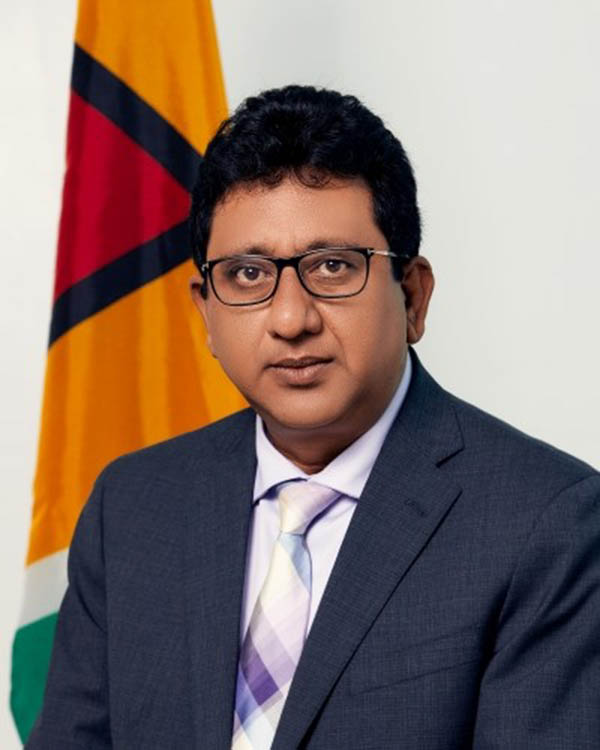Attorney General Anil Nandlall says that President Irfaan Ali will soon tell the nation more about the directors of the board to be established for the Natural Resource Fund.
Nandlall says that the process will be no different from formulas outlined in other laws.
“The Bill says not more than five not less than three, it means the President can appoint. He will say as he deems fit. The legislation has given the President that prerogative. There is nothing unusual about that. That is a formula that is used on a regular basis,” Nandlall told Stabroek News yesterday when contacted for an explanation of the selection mechanism.
“I heard him say that he is going to make the announcement [selection mechanism] quite shortly. He said it when he invited the people to witness his assent of the Local Content Bill,” the Attorney General added.
Nearly a week after the NRF Bill was assented to by the President, there has been no clear explanation of how persons for the Board that will manage the fund will be chosen.
Section 5 (1) of the Natural Resource Fund Act states “There shall be a Board of Directors of the Fund which shall comprise of not less than three and not more than five members who shall be appointed by the President, one of whom shall be appointed Chairperson by the President.”
The Bill in Section 5(2) speaks about who the directors shall be, explaining that they “…shall be elected from among persons who have wide experience and ability in legal, financial, business or administrative matters, one of whom shall be nominated by the National Assembly and one of whom shall be a representative of the private sector.
The Bill says nothing about the selection process or selector, rather it says in Section 5(3) and (4), “The Directors shall be appointed for a period not exceeding two years and shall be eligible for reappointment. (4) The appointment of the Directors and every change in the appointment shall be published in the Gazette, on the website of the Ministry and in two daily newspapers circulating in Guyana.”
According to the Bill, the Board shall be responsible for the overall management of the Fund; reviewing and approving the policies of the Fund; monitoring the performance of the Fund; ensuring compliance with the approved policies of the Fund; exercising general oversight of all aspects of the operations of the Fund, and ensuring that the Fund is managed in compliance with this Act and all other applicable laws.
Nowhere in the controversial Bill which was rushed through a chaotic sitting of the National Assembly on Wednesday does it outline how the Directors would be selected and who determines their eligibility for selection. This has been a point of contention since the government published the Bill and a matter that they have consistently failed to address.
Following the passage of the Bill, the government last week called a press conference at the Arthur Chung Conference Centre to address the events of last Wednesday’s sitting when the Bill was passed, and to explain its decision to forge ahead with its passage, despite protests from civil society and the Opposition.
Then, Senior Minister in the Office of the President with responsibility for Finance, Dr Ashni Singh, emphasised that the President was responsible for appointment of the Board but everyone stayed clear of an explanation of the selection process.
Nandlall says that the President will clear up the issue shortly, even as he contended that the APNU+AFC 2019 Bill did not have a selection mechanism on how the 22-member oversight committee would have been chosen.
“That formulation is not unique to that piece of legislation. Many legislation contain a similar formula, whereby the appointing agency can choose within a number,” he said. He explained that in this case the President is the appointing agency and repeated that “Many legislation will say not more than five not less than three.”
“Let us take the Law Reform Commission Bill, the amendment I did. It says clearly the Minister shall appoint a nominee from, and it lists the agency. It also says the President shall appoint two in the exercise of his deliberations .The president will determine how many within that formula he will appoint; whether he will appoint five or whether he will appoint three or whether he will appoint four,” he said.
Further, he added, “If you look at the previous Act, it has 22 representatives… but they list 12 agencies. It meant the President would have appointed the others on his own.
The reposing of powers of selection and appointment with the President for this board has raised serious concerns about the concentration of power and accountability.
‘Too important’
And as the nation waits on the President, the Private Sector Commission, which the law states will have one representative, is already planning on how its nominee will selected with its Chairman Paul Cheong saying it will be an inclusionary process , as the post is “too important” to not have consensus.
Cheong explained that next week there will be a meeting of the PSC and a discussion to “chart a way forward” will be on the agenda, although they have not yet received formal notification to submit their nominee’s name.
“We will have to open up for the sectoral bodies to nominate and we will have to go through a process. This is an important position and it has to be open,” he said underlining the importance of the legislation.
“We will have to appoint a committee to look at it and try to find the best possible persons,” he said. After the nominations, there will be a vote to determine the best person and that person’s name will be forwarded to the President for his approval or rejection.



